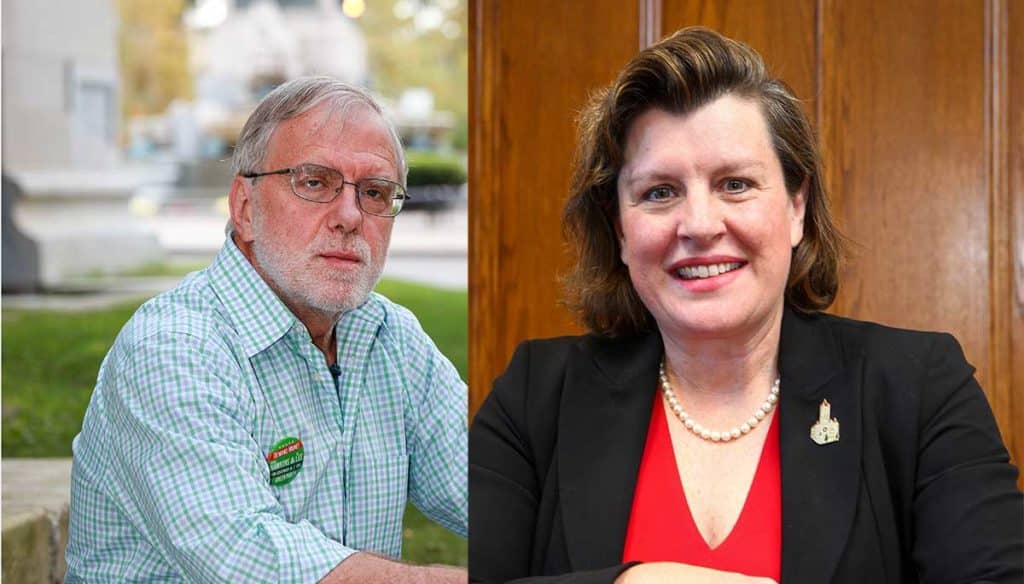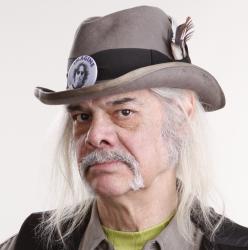Like the Syracuse New Times, gubernatorial candidates Howie Hawkins and Stephanie Miner are local and alternative.
As the backbone of the local Green Party, and former rank-and-file member of UPS union 317, Hawkins has run for office unsuccessfully 24 times. But winning is not the point, he observes, since amassing more than 50,000 votes in each of the last three elections for governor has ensured a place on the ballot for the following election and a platform for his ecologically friendly messages.
After a stint on the Syracuse Common Council and two terms as the city of Syracuse’s mayor, Miner, currently teaching at New York University, expressed interest in a congressional run before gathering enough signatures from registered voters to qualify as an independent candidate for governor on the Serve America Movement line.
Miner is not talking about next year’s county executive race, occasioned by Joanie Mahoney’s resignation, but Hawkins says he is definitely not interested — at least for now.
Other gubernatorial candidates include Democratic incumbent Andrew Cuomo seeking a third term (he is also on the Working Families, Independence and Women’s Equality lines), Republican challenger Marc Molinaro (also on the Reform and Conservative lines) and the Libertarian Party’s Larry Sharpe. The state’s board of elections has disqualified candidate Jimmy McMillan from this year’s ballot on his Rent Is Too Damn High party line.
You’re running for governor, which is a real long shot. Why not run to replace retiring state Sen. John DeFrancisco, which you could probably definitely win?
Stephanie Miner: I never got into politics for ambition. If that’s why I had gotten involved in it, there would have been a lot easier jobs that I could have run for than being mayor.
I am attracted by the idea of having problems and having policies to solve them. What I have seen is that there are deep-seated problems that we have as a state; the culture in Albany that serves special interests, most notably campaign contributors, is not helping solve those problems. Standing up and speaking that message is more important than whether or not I’m competitive.
Why not run for the 4th Council District, which you almost won?
Howie Hawkins: I’ve run for 4th Council District four times, receiving as high as 48 percent of the vote. But this year we have state and federal elections and the Green Party asked me to run for governor.
In 2014, the 5 percent I received were votes Cuomo wanted. He had wanted to roll up his vote to get more than his father ever got and lay the basis for a run for president. Instead, he got a lower percentage than he got in 2010. So he looked at what we were demanding and moved our way. We got the ban on fracking and paid family leave. But our 5 percent forced Cuomo to act. Being a corporate Democrat, he talks to the left and governs to the right. So we want another sizable vote to push our demands further.
As governor, using Syracuse as a model, how would you deal with the issue of poverty?
Miner: It impacts every part of the life cycle. You have to make sure young children have enough to eat, that families have safe housing, that we do what we can to prevent people from being homeless, that we give them the support they need. But we also have to link up the skills that our economy needs to the skills that they have so we can give them job training that will actually lead to a job.
Hawkins: Liberals and conservatives, Democrats and Republicans, make poverty a big mystery. They create so-called anti-poverty programs that pay professional middle-class people to supposedly educate, train and counsel the poor on how to behave. And the poor stay poor because wages remain low, there are not enough good jobs, and the rent is too damn high.
The answers are clear. Raise wages and public assistance. Enforce laws against discrimination and segregation. Rebuild the housing, infrastructure and businesses in poor neighborhoods.
What about health care? Is the goal free health care for everybody?
Miner: That is an illustration of how ill-equipped the political system has become to deal with the real issues. We have to have an honest discussion about how can we pay for health care so that we can get better results and be more efficient. There’s no such thing as a free lunch, and there’s no such thing as free health care.
In New York state we have the highest tax burden in the United States. And yet we are seeing services crumble, we see homelessness. And yet what are we spending money on? Billions of dollars on failed economic development projects which we can see don’t work, and they are mired in corruption.
One of the reasons I got into this race as a nontraditional candidate with the independent Serve America Movement was to say that the traditional party structure and the traditional political system is not having a substantive dialogue about the public policies that are facing New York. We’re concerned with the lack of civility, the lack of relevant data for science, engaging in hyper-partisanship instead of solving problems.
Hawkins: Yes, free at the point of delivery through universal single-payer public health care. We pay for it through progressive taxes that will be less for 98 percent of us than we now pay in taxes for Medicare and Medicaid and for private insurance premiums, co-pays, deductibles, and out-of-pocket fees for uncovered services. It would cover all medically necessary services for all New York residents.
It’s called the New York Health Act. It has passed the state Assembly four consecutive years and is one vote short in the state Senate. I am the only candidate for governor on the November ballot who will sign the bill when it passes.
Word is New York is the most corrupt state in the union. How corrupt is it?
Miner: Hardly a week goes by that there’s not an announcement about an investigation, an indictment, a trial, a conviction, a sentencing. If you look at how other people measure, New York is one of the most corrupt. I guess we should be thankful for Alabama because we’re neck and neck with Alabama.
And then there’s the corruption that’s not illegal: We have the worst voter participation in the United States because we make it so difficult to participate. It’s all driven by the need to have politicians control their voters, not voters control their politicians.
Hawkins: New York is more corrupt today than when George Washington Plunkitt, the Gilded Age state senator from Tammany Hall, defended his pay-to-play patronage machine funded by the robber barons of his day as “honest graft.”
More than 50 state officials have been driven from office for crimes and ethics violations since 2000. We need public campaign finance, independent ethics oversight in place of the politician-appointed Joint Commission of Public Ethics, and a new Moreland Commission on public corruption. We need a full-time legislature with limits on outside income and term limits of two four-year terms for state executive offices and six two-year terms for state legislators.
With such extensive diversity, is it possible to set standards for education in this state?
Miner: It’s imperative that we do. In a global marketplace in the 21stt century we have to have a skilled workforce, and you do that through your public education system.
Hawkins: Standardized texts are inherently class- and cultural-biased, even the math tests. A teacher told me about a really good student who wasn’t able to figure out a math problem about determining the area of a patio. The kid lived in a trailer park. He knew the math. He just didn’t live in an environment where he would know what a patio was.
The state should call off its high-stakes testing scam. The tests are not used for educational purposes to help the teachers and students. They are used to rank the teachers, students and schools; blame the teachers instead of high poverty for predictably low-scoring schools; and then privatize high-poverty schools into charter schools where investors can write off 39 percent of their investments in charters every year while collecting interest and doubling their money in seven years. It’s a raid on public school budgets and an attack on unionized teachers.
Are you progressive?
Miner: I think that when you have a job like a mayor and you’re interested in solving problems, you realize that ideology doesn’t solve problems. It may give you a viewpoint, a level of experience, but what solves problems is being able to think through solutions and listen to different points of view and understanding that everybody has a part of the solution.
Hawkins: If we are going to have responsive democratic government, liberal regulation of capitalism won’t work. Big business uses its economic power to regulate the regulators. Progressives need to become socialists for system change if we are going to implement real solutions to the problems we face, from poverty, crumbling infrastructure, crappy health insurance, price-gouging cable companies and the climate emergency.
What is the upstate/downstate conflict?
Miner: They have very different lifestyles and they have very different challenges. But there’s also a sense on both sides that the political system is not meeting those challenges. The subway system is crumbling around New Yorkers, and that’s the lifeblood of the city. A million New Yorkers have left this state in the past eight years. That’s more than any other state in the union.
Hawkins: It’s a dirty bourgeois trick, a divide-and-conquer strategy promoted by capitalists and their paid-for representatives in both major parties.
Working people all over the state face the same problems. Our wages are stagnant while the rent, health care, college, property taxes, and other costs of living keep rising. Infrastructure is crumbling. The schools are cutting back on music, sports, literature, history, civics and science. Forty percent of children in Syracuse and Buffalo are being disabled by lead poisoning. The climate crisis accelerates. The politicians can’t even solve the simple problem of finding one day for federal, state, and local primaries.
So upstate politicians blame downstate and downstate politicians blame upstate. Anybody but themselves. It’s time for working people to start electing their own people independently of the two-party system of corporate rule.



